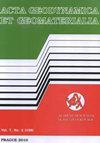A new adaptive WVS based denoising method on GNSS vertical time series
IF 0.8
4区 地球科学
Q4 GEOCHEMISTRY & GEOPHYSICS
引用次数: 0
Abstract
Improper selection of modal decomposition numbers and penalty factors in Variational Modal Decomposition (VMD) can result in over-decomposition and under-decomposition issues, impacting the analysis of high-precision Global Navigation Satellite System (GNSS) time series for geodynamics and geophysics research purposes. This work shows a new WOA-VMD-SSA (WVS) denoising method combining Whale Optimization Algorithm (WOA) and the VMD together with the Singular Spectrum Analysis (SSA) method. Simulated data comprising a combination of Flicker noise plus White noise (FN+WN) and General Gauss-Markov plus White noise (GGM+WN) were utilized in our experiments. That the simulation results show that WVS root mean square error (RMSE) decreased by 0.88 to 0.91mm compared to Empirical Mode Decomposition (EMD), Ensemble Empirical Mode Decomposition (EEMD) and Complete Ensemble Empirical Mode Decomposition with Adaptive Noise (CEEMDAN). The signal-to- noise ratio (SNR) and correlation coefficient (CC) increased by 1.08 to 1.12 dB and 0.17 to 0.18, respectively. And the WVS method has the smallest difference from the true value. Finally, experimental analysis was conducted by using the vertical component of the GNSS time series from 100 GNSS sites located in the west coast of the USA. The real data results show that compared with EMD, EEMD and CEEMDAN methods, WVS can effectively reduce the uncertainty of station velocity and obtain more accurate velocity values, which is consistent with the conclusions of our simulations. Besides, the WVS algorithm can adaptively determine the optimal parameters for VMD decomposition, and it is also more efficient in time series noise removal.一种新的基于WVS的GNSS垂直时间序列自适应去噪方法
变分模态分解(VMD)中模态分解数和惩罚因子的选择不当会导致过度分解和欠分解问题,影响高精度全球导航卫星系统(GNSS)时间序列的地球动力学和地球物理研究。这项工作展示了一种新的WOA-VMD-SSA(WVS)去噪方法,该方法将Whale优化算法(WOA)和VMD与奇异谱分析(SSA)方法相结合。在我们的实验中使用了包括闪烁噪声加白噪声(FN+WN)和一般高斯-马尔可夫加白噪声的组合的模拟数据。仿真结果表明,与经验模式分解(EMD)、集成经验模式分解和自适应噪声完全集成经验模式(CEEMDAN)相比,WVS均方根误差(RMSE)降低了0.88至0.91mm。信噪比(SNR)和相关系数(CC)分别增加了1.08到1.12 dB和0.17到0.18。WVS方法与真实值的差异最小。最后,利用美国西海岸100个GNSS站点的GNSS时间序列的垂直分量进行了实验分析。实际数据结果表明,与EMD、EEMD和CEEMDAN方法相比,WVS可以有效降低站点速度的不确定性,获得更准确的速度值,这与我们的模拟结论一致。此外,WVS算法可以自适应地确定VMD分解的最优参数,并且在时间序列噪声去除方面也更有效。
本文章由计算机程序翻译,如有差异,请以英文原文为准。
求助全文
约1分钟内获得全文
求助全文
来源期刊

Acta Geodynamica et Geomaterialia
地学-地球化学与地球物理
CiteScore
2.30
自引率
0.00%
发文量
12
期刊介绍:
Acta geodynamica et geomaterialia (AGG) has been published by the Institute of Rock Structures and Mechanics, Czech Academy of Sciences since 2004, formerly known as Acta Montana published from the beginning of sixties till 2003. Approximately 40 articles per year in four issues are published, covering observations related to central Europe and new theoretical developments and interpretations in these disciplines. It is possible to publish occasionally research articles from other regions of the world, only if they present substantial advance in methodological or theoretical development with worldwide impact. The Board of Editors is international in representation.
 求助内容:
求助内容: 应助结果提醒方式:
应助结果提醒方式:


